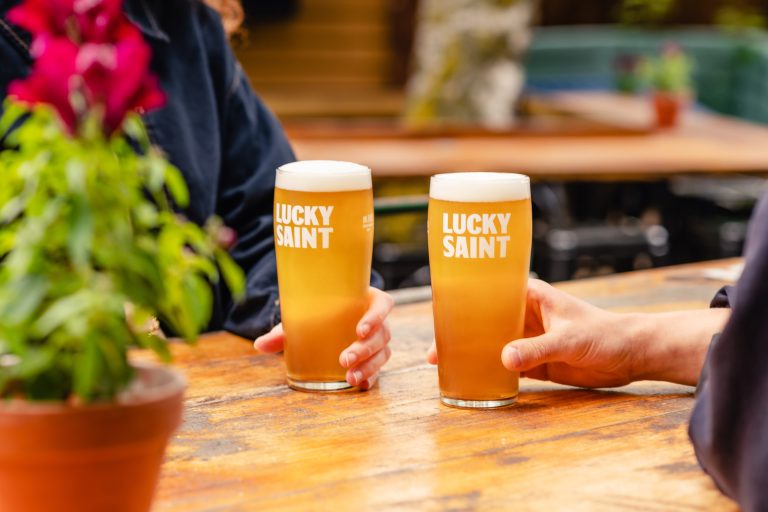In a rapidly evolving landscape of drinking habits across the UK, new research reveals that more adults are opting for alcohol-free alternatives. The findings, outlined in a new report titled “2024 Low and No: Drinking Differently,” produced by research consultancy KAM and alcohol-free beer brand Lucky Saint, shed light on the growing trend of moderation and alcohol-free options in social settings.
The report paints a picture of a nation increasingly focused on mindful drinking. A staggering 76% of UK adults now consider it acceptable to enjoy alcohol-free beer at their desk at work, with younger adults (aged 18-24) being even more open to the idea, at 85%. The trend towards moderation is also reflected in the rise of alcohol-free choices in social environments such as pubs and restaurants, with over a third of visits to these venues now alcohol-free.
Moderation Becoming the Norm
A major finding from the report is that moderation of alcohol consumption is becoming a consistent, year-round practice for many. Gone are the days when people would only cut back on drinking during events like Dry January. Now, 3 out of 4 UK adults actively moderate their alcohol intake across the year, regardless of the season or occasion. This change is reflected in sales data from the past year, which shows that moderation is just as prevalent during summer months as it is during festive periods.
According to the report, over 11 million UK adults (16% of the population) tried low and no-alcohol beer for the first time in the past year, signalling a significant shift in drinking habits. Additionally, the number of UK adults who consume alcohol more than once a month has dropped from 93% in 2023 to 88% in 2024, a clear indicator of the nation’s growing preference for alcohol-free alternatives.
Katy Moses, Managing Director at KAM, noted that this trend spans all age groups, with many individuals employing strategies like “zebra striping” – alternating between alcoholic and alcohol-free drinks during a single occasion. “Active moderation is happening across all days of the week,” Moses said, “with 1 in 4 UK adults using tactics to reduce their alcohol consumption.”
The report also highlights the cultural shift among younger adults, particularly those aged 18-24. More than 1 in 5 of this age group report not drinking alcohol at all, making them the most abstinent demographic. Despite this, their love for pubs and social venues remains strong, with 53% of 18-24-year-olds visiting pubs or bars at least once a week. For many of these younger patrons, the availability of quality alcohol-free options is a key factor in their decision to stay out for longer. Indeed, 68% of 18-24-year-olds say they have left a venue early or felt disappointed due to a lack of alcohol-free choices.
Zebra Striping and Social Influence
The report shines a spotlight on the growing practice of “zebra striping,” where individuals alternate between alcoholic and non-alcoholic drinks in a single social event. This approach to drinking moderation is becoming increasingly common, with a quarter of UK drinkers now practising zebra striping when visiting pubs and bars. When this is expanded to include any combination of alcoholic and alcohol-free drinks, the figure rises to 2 in 3 adults, with 78% of 18-24-year-olds engaging in this behaviour.
The influence of non-drinkers on social settings is also becoming more pronounced. In 2024, 65% of UK adults reported that the presence of a non-drinker in their group influenced the choice of venue, a sharp rise from 46% in 2023. Among younger adults, this figure climbs to 85%, showing how alcohol-free options are reshaping the social scene.
Luke Boase, founder of Lucky Saint, remarked on the significant changes in social dynamics. “After thousands of years of centring social occasions around drinking, we’re seeing a rapid cultural shift in attitudes towards alcohol. It’s exciting to see how people are incorporating alcohol-free drinks into their lives, and the emergence of zebra striping is just one example of this.”
Boase also noted the potential positive impact of this shift on public health, with alcohol-free drinks offering a healthier alternative without sacrificing the social experience. “There’s a great opportunity for alcohol-free drinks to have a huge positive impact on the health of the nation,” he said. “Continuing to improve the availability and visibility of quality alcohol-free options will be critical in making that happen.”
Changing Social Norms
The report underscores how moderation has become a routine part of social life in the UK. Contrary to the perception that alcohol moderation is limited to weekdays or specific events, the research shows that the most common time for moderation is now during weekends, with 31% of UK adults choosing to cut back on alcohol on Saturdays and Sundays. This compares to 27% on weekdays, 17% during celebratory events, and 11% during Dry January.
As more Brits embrace moderation, alcohol-free drinks are increasingly becoming part of mainstream culture. The introduction of alcohol-free options in supermarket meal deals, for example, reflects how alcohol-free beverages are no longer confined to bars and pubs but are available in everyday settings.
For pubs and social venues, this shift represents a significant opportunity. Rather than driving patrons away, the rise in alcohol-free options is attracting new customers and encouraging longer stays. The future of socialising in the UK, according to the report, will be less about alcohol and more about quality experiences that cater to both drinkers and non-drinkers alike.
With the growing popularity of alcohol-free drinks, it seems the UK is well on its way to becoming a nation of mindful moderators.


